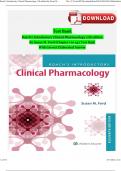Roach’s Introductory Clinical Pharmacology 11th edition By Susan M. ... file:///C:/Users/HP/Downloads/Roach%E2%80%99s%20Introducto
Test Bank
Roach’s Introductory Clinical Pharmacology 11th edition
By Susan M. Ford (Chapter 1 to 54) Test Bank
With Correct Elaborated Answer
1 of 613 8/13/2024, 12:21
,Roach’s Introductory Clinical Pharmacology 11th edition By Susan M. ... file:///C:/Users/HP/Downloads/Roach%E2%80%99s%20Introducto
Contents
Unit 1 Nursing Foundation of Clinical Pharmacology
1 General Principles of Pharmacology
2 Administration of Drugs
3 Making Drug Dosing Safer
4 The Nursing Process
5 Client and Family Teaching
Unit 2 Drugs Used to Fight Infections
6 Antibacterial Drugs: Sulfonamides
7 Antibacterial Drugs That Disrupt the Bacterial Cell Wall
8 Antibacterial Drugs That Interfere With Protein Synthesis
9 Antibacterial Drugs That Interfere With DNA/RNA Synthesis
10 Antitubercular Drugs
11 Antiviral Drugs
12 Antifungal and Antiparasitic Drugs
Unit 3 Drugs Used to Manage Pain
13 Nonopioid Analgesics: Salicylates and Nonsalicylates
14 Nonopioid Analgesics: Nonsteroidal Anti-inflammatory Drugs and Migraine Headache
Medications
15 Opioid Analgesics and Antagonists
16 Anesthetic Drugs
Unit 4 Drugs That Affect the Central Nervous System
17 Central Nervous System Stimulants
18 Antidementia Drugs
19 Antianxiety Drugs
20 Sedatives and Hypnotics
21 Antidepressant Drugs
22 Antipsychotic Drug
Unit 5 Drugs That Affect the Peripheral Nervous System
23 Adrenergic Drugs
24 Adrenergic Blocking Drugs
25 Cholinergic Drugs
26 Cholinergic Blocking Drugs
Unit 6 Drugs That Affect the Neuromuscular System
27 Antiparkinson Drugs
28 Antiepileptics
2 of 613 8/13/2024, 12:21
,Roach’s Introductory Clinical Pharmacology 11th edition By Susan M. ... file:///C:/Users/HP/Downloads/Roach%E2%80%99s%20Introducto
29 Skeletal Muscle, Bone, and Joint Disorder Drugs
Unit 7 Drugs That Affect the Respiratory System
30 Upper Respiratory System Drugs
31 Lower Respiratory System Drugs
Unit 8 Drugs That Affect the Cardiovascular System
32 Diuretics
33 Antihyperlipidemic Drugs
34 Antihypertensive Drugs
35 Antianginal and Vasodilating Drugs
36 Anticoagulant and Thrombolytic Drugs
37 Cardiotonic and Antiarrhythmic Drugs
Unit 9 Drugs That Affect the Gastrointestinal System
38 Upper Gastrointestinal System Drugs
39 Lower Gastrointestinal System Drug
Unit 10 Drugs That Affect the Endocrine System
40 Antidiabetic Drugs
41 Pituitary and Adrenocortical Hormones
42 Thyroid and Antithyroid Drugs
43 Male and Female Hormones
44 Uterine Drugs
Unit 11 Drugs That Affect the Urinary System
45 Menopause and Andropause Drugs
46 Urinary Tract Anti-Infectives and Other Urinary Drugs
Unit 12 Drugs That Affect the Immune System
47 Vaccines
48 Immunostimulants and Immunomodulators
49 Immune Blockers
Unit 13 Drugs That Fight Cancer
50 Traditional Chemotherapy
51 Immune Modulating Therapies
Unit 14 Drugs That Affect Other Body Systems
52 Skin Disorder Topical Drugs
53 Otic and Ophthalmic Preparations
54 Fluids, Electrolytes, and Parenteral Therapy
3 of 613 8/13/2024, 12:21
,Roach’s Introductory Clinical Pharmacology 11th edition By Susan M. ... file:///C:/Users/HP/Downloads/Roach%E2%80%99s%20Introducto
1. A nursing instructor is preparing a teaching plan for a group of nursing students about
pharmacology. When describing this topic, the instructor would focus the discussion on
which of the following as an essential aspect?
A) Drug name
B) Drug class
C) Drug action
D) Drug source
ANS: C Feedback:
Pharmacology is the study of drugs and their action on living organisms. Thus, an
essential aspect of pharmacology is drug action. An understanding of the drug
name, drug class, and drug source is important, but the most critical aspect related
to pharmacology is how the drug acts in the body.
2. A nursing student is preparing to administer a prescribed drug to a patient. The student
reviews information about the drug and its actions. Which of the following would be the best
choice for obtaining this information? Select all that apply.
A) Nursing instructor
B) Nurse assigned to the patient
C) Clinical drug reference
D) Prescribing health care provider
E) Clinical pharmacist
ANS: C, E
Feedback:
Although the nursing student can ask the nursing instructor, the nurse assigned to
the patient, and the prescribing health care provider for information about the drug,
the best choices for drug information would include an appropriate drug reference
and the clinical pharmacist.
3. When describing the various types of medications to a group of nursing students, a
nursing instructor would identify which of the following as a source for deriving
medications? Select all that apply.
A) Plants
B) Synthetic sources
C) Mold
D) Minerals
E) Animals
ANS: A, B, C, D, E
Feedback:
Medications are derived from natural sources, for example, plants, molds, minerals,
and animals, as well as created synthetically in a laboratory.
4 of 613 8/13/2024, 12:21




